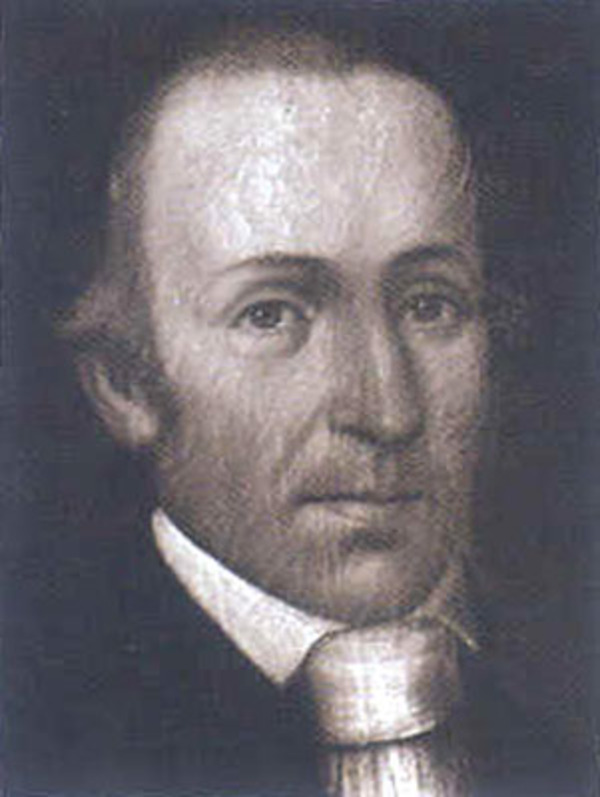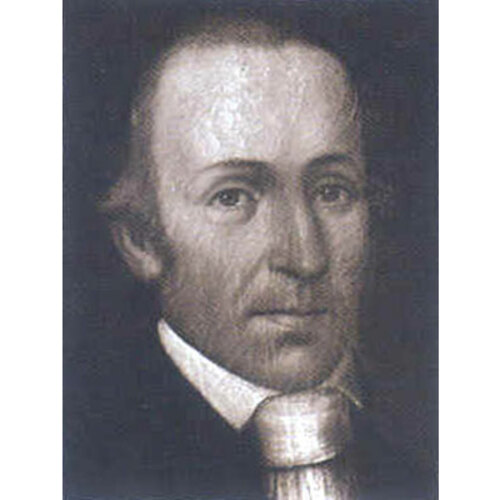
Source: Link
HAENKE, TADEO (Tadeáš, Thaddeus), scientist and explorer; b. 1761, probably on 5 October, in Kreibitz (Chřibská, Czechoslovakia), son of Elias Georg Thomas Hänke and his wife Rosalia; d. unmarried in 1817 near Cochabamba (Bolivia).
Tadeo Haenke took university courses in mathematics and astronomy in Prague, and at age 25 went to Vienna University to study medicine and botany. Knowledgeable and enthusiastic, he was recommended by Professor Nikolaus Josef Jacquin to Alejandro Malaspina, the commander of a Spanish scientific and exploratory expedition which was expected to circle the globe. The Descubierta and the Atrevida left Cadiz on 30 July 1789 but Haenke, after a dash for that city, arrived there a few hours too late to embark. Obtaining passage for Montevideo (Uruguay), Haenke went in pursuit, only to suffer shipwreck off the South American coast on 23 November, shortly before the expected time of arrival; he was forced to swim ashore with some of his equipment under his arm. Again he missed the expedition. He consequently undertook a historic crossing of the pampas and the southern Andes, finally joining the expedition at Valparaíso (Chile) in mid April 1790. On the way Haenke had practised his specialties, taking notes on zoology, mineralogy, and particularly botany.
Once he became an active member of the expedition Haenke worked closely with its chief of natural science, Antonio Pineda, and the botanist Luis Neé, but his superior knowledge permitted him considerable latitude and independence. Stops were made at various ports on the way northward until the expedition reached Acapulco (Mexico) in February 1791 and prepared for a voyage to the northwest coast. Leaving Acapulco on 2 May, the vessels sailed far to the north before touching land. The first stop, late in June, was at Port Mulgrave (Yakutat Bay, Alaska), and there Haenke resumed his study of natural history. In boats he and others visited a small bay to the north where an island not far from Malaspina Glacier was named for him. Possessed of wide-ranging interests and skills, Haenke turned his hand to recording the music of the Tlingit Indians, and also demonstrated his own musicianship by playing the harpsichord on board the Descubierta for the entertainment of his colleagues.
On 12 August the expedition, having sailed south along the coast, arrived in Nootka Sound (B.C.) where Pedro de Alberni was in charge of the Spanish settlement of Santa Cruz de Nutka. Here Haenke enlarged his collections, classifying specimens according to the Linnaean system. His results form the oldest systematic ordering and cataloguing of the botanical species of present-day western Canada. Haenke was disappointed in his relatively small collection of plants; he could not find many species distinct from those of Europe, but he did discover a great number of conifers which differed from European varieties, and also found that the natives used spruce beer as an effective antiscorbutic. While he was in Nootka Sound Haenke continued his observation of the coastal Indians and recorded some of the music of the local Nootkas.
The expedition left Nootka Sound on 28 August and reached Acapulco in mid October. After a voyage across the Pacific to the Orient and Australia, Malaspina’s ships returned to the Americas. In October 1793 Haenke went ashore with a companion at Callao (Peru) to begin an overland journey to Buenos Aires (Argentina), where he was to rejoin the expedition in October or November of the following year. The proposed schedule would have proved impossible even if Haenke had tried to follow it, but he became so engrossed in his studies in the heart of South America that he spent the remainder of his life there. He continued to draw the salary he had received as a member of the expedition until his death some 24 years later near Cochabamba after significant exploration in present-day Peru, Bolivia, and Brazil.
Haenke’s skill and hard work were greatly appreciated by associates, government officials, and the European scientific community. More than any other member of the Malaspina party Haenke has received recognition, being considered by some a worthy precursor to the more famous German naturalist Friedrich Wilhelm Karl Heinrich Alexander von Humboldt. Haenke’s incessant, tireless, and efficient labour embraced a variety of scientific fields including chemistry, botany, geology, astronomy, geography, and mineralogy. His writings, both published and unpublished, have won for him the attention of a number of biographers and the occasional reprinting of some of his works.
Archivo General de la Nación (Buenos Aires), Fondo Biblioteca Nacional, legajo 48, doc.38; legajo 130, doc.115; legajo 138, doc.123; legajo 286, doc.4319; legajo 314, doc.5127; Sala IX, Fondo período colonial-gobierno, 4-6-1, Reales órdenes y cédulas, Consulado antecedentes T.I.: f.280; 24-4-14, Reales órdenes, libro 68: ff.71–72; 25-2-2, Reales órdenes, libro 24: ff.157, 170; 25-4-13, Reales órdenes, libro 67: f.49; 30/6/5, Interior leg. 47, exp.24; Communicaciones y resoluciones reales, libro 9: f.68. Biblioteca y Archivo Nacional de Bolivia (Sucre), mss concerning Tadeo Haenke. Museo Naval (Madrid), mss relating to the Malaspina expedition. C. W. Arnade and Josef Kühnel, El problema del humanista Tadeo Haenke; nuevas perspectivas en la investigación haenkeana (Sucre, 1960). L. H. Destefani and D. [C.] Cutter, Tadeo Haenke y el final de una vieja polémica (Buenos Aires, 1966). Josef Kühnel, Thaddaeus Haenke, Leben and Wirken eines Forschers (Prague, 1960).
Cite This Article
Donald C. Cutter, “HAENKE, TADEO (Tadeáš, Thaddeus),” in Dictionary of Canadian Biography, vol. 5, University of Toronto/Université Laval, 2003–, accessed December 18, 2025, https://www.biographi.ca/en/bio/haenke_tadeo_5E.html.
The citation above shows the format for footnotes and endnotes according to the Chicago manual of style (16th edition). Information to be used in other citation formats:
| Permalink: | https://www.biographi.ca/en/bio/haenke_tadeo_5E.html |
| Author of Article: | Donald C. Cutter |
| Title of Article: | HAENKE, TADEO (Tadeáš, Thaddeus) |
| Publication Name: | Dictionary of Canadian Biography, vol. 5 |
| Publisher: | University of Toronto/Université Laval |
| Year of publication: | 1983 |
| Year of revision: | 1983 |
| Access Date: | December 18, 2025 |



